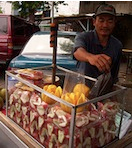“Start a Green Business Series”: Sustainable Mobile Food Vendor
Sustainable mobile food vendors offer a selection of healthy, organic snacks and simple meals with low carbon footprints through a mobile cart. These businesses can provide a healthy alternative to fast food and vending machines in underserved communities, as well as near schools, workplaces, and other locations where healthy food is hard to find.
There is growing interest in these businesses as a means to achieve healthier populations, especially in underserved locations where healthy food, farmer’s markets, and/or organic grocers are sparse or non-existent. The city of New York passed a resolution increasing the number of mobile food vendor permits it would grant, with the caveat that these vendors may only sell fresh, whole foods that were healthy and sustainable into neighborhoods where those items are not readily available. The city of San Francisco issued an executive order in July 2009 to a similar end, requiring that in granting mobile food vendor permits, the city must either require the sale of healthy and sustainably produced food or give preference to those who do. Similar initiatives will likely follow in many other cities, as the link between health of citizens and access to healthy food has become virtually undeniable.
What required knowledge or skills are necessary?
There are no formal educational or training requirements for this job. However, the work is strenuous and requires that the worker be able to be on their feet for extended periods of time, be capable of preparing a diversity of foods, and be able to lift up to 25 pounds and potentially push a cart over curbs, up ramps or around debris.
How much money is required to start?
$ (on a scale of $ to $$$$$)
What is the income potential?
$$ (on a scale of $ to $$$$$)
What is the best location for a sustainable mobile food vendor?
Urban (best), semi-urban (very good), suburbs (very good), rural (fair).
Three best questions to ask yourself to find out if this business is right for you (if you can answer yes to all three, this business might be for you):
Do you enjoy preparing food?
Do you often see locations where people have few options for food choices and end up buying unhealthy fast food?
Are you passionate about helping people live healthier?
Scott Cooney
Scott Cooney (twitter: scottcooney) is an adjunct professor of Sustainability in the MBA program at the University of Hawai'i, green business startup coach, author of Build a Green Small Business: Profitable Ways to Become an Ecopreneur (McGraw-Hill), and developer of the sustainability board game GBO Hawai'i. Scott has started, grown and sold two mission-driven businesses, failed miserably at a third, and is currently in his fourth. Scott's current company has three divisions: a sustainability blog network that includes the world's biggest clean energy website and reached over 5 million readers in December 2013 alone; Pono Home, a turnkey and franchiseable green home consulting service that won entrance into the clean tech incubator known as Energy Excelerator; and Cost of Solar, a solar lead generation service to connect interested homeowners and solar contractors. In his spare time, Scott surfs, plays ultimate frisbee and enjoys a good, long bike ride. Find Scott on Google Plus

Get your signed copy of
Build a Green Small Business (McGraw-Hill)!
Or...talk with the author!
Click here to schedule an hour consultation.
 Green franchise opportunities:
Other green business ideas
Green franchise opportunities:
Other green business ideas
- Healthy Fast Food
- Farmer's Market
- Personal Trainer & Diet Planner
- Juice Bar and Smoothie Café
- Green Building Materials Store
- Permaculture and Urban Farming
- Edible and Organic Floristry
- Energy Efficiency Auditing
- Ecotourism and Sustainable Travel Planner
- Sustainable Coffee House
- Consignment Shop for Kids Clothing & Toys
- Natural Foods Co-op
- Sustainable Food Prep and Cooking Instruction
- Food Plant Nursery
- Mesh Network Telephone and Internet Company
- Drive-thru Coffee Stand & Espresso Shop
- Eco-Friendly House Cleaning Service
- Organic Backyard Garden Landscape Design
- Green Bed and Breakfast (B&B)
- Sustainable Mobile Food Vendor
- Biodiesel Cooperative
- Eco Friendly Pool and Spa Cleaning
- Green Wedding and Sustainable Event Planner
- Organic Farm
- Gift Basket Service
- Pedicab Company
- Used Books Vending Machines
- Organic Day Spa
- Restaurant Food Delivery Service
- Used Bicycle Retailer
- Landscape Maintenance in Arid climates
- Organic Food Delivery Service
- Outdoor Gear Consignment Shop
- Eco Concierge Service and Relocation Specialist
- Organic Community Supported Agriculture
- Sustainable Property Management
- Residential Solar



